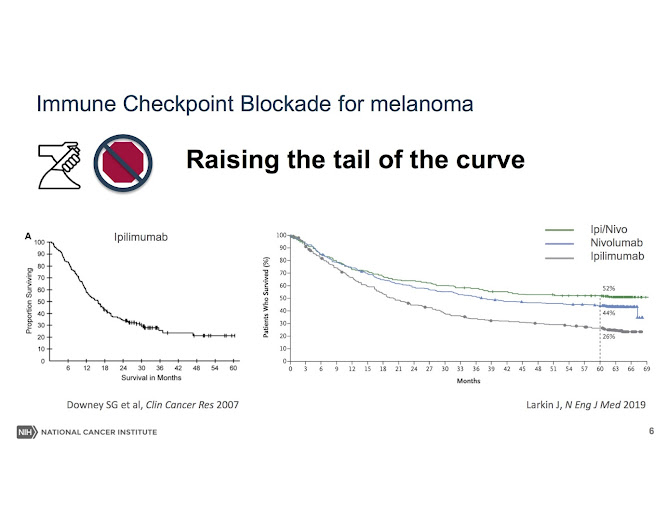On Thursday I had another set of CT scans (#60 for those keeping count). Today all the readings were posted, and I remain cancer-free. The last time I had any evidence of disease was five years ago, in June 2020, when I received radiation therapy for a persistent tumor. Five years without evidence of disease is a common measurement of being cured of many types of cancers -- but not metastatic bladder cancer. That's because, prior to immunotherapy, very few met BC patients managed to hit the five year mark. And even now, seven years after the first immunotherapy drugs were approved, there are relatively few mets BC patients who can claim five years with no evidence of disease. Dr. Maughan, my oncologist, said that I am the data. There is insufficient evidence to guide therapeutic decisions in my circumstances. The main question was whether to stick with semi-annual scans, or switch to annual scans. We decided to split the baby and schedule the next set of scans a year from now, but also schedule a six month check-in to see if I wanted an earlier scan.
More challenging, and less clear, is the question of whether I can legitimately consider myself cured of cancer. "Cure" is a layperson term that oncologists don't like to use, because it is maddeningly imprecise. I've been free of metastatic disease for five years. But there is no statistical data to inform anyone whether someone who has had metastatic bladder cancer but has not had symptoms for five years can say that the odds of recurrence are so low that the likelihood or recurrence is negligible. So am I cured? No one knows.
Over the past few years, I have gradually learned to change my mindset from waiting to die to learning to embrace life. I no longer am expecting to die soon, and that shift has been revelatory. An important aspect of that shift has been my relationship with Lindsay, a long-time friend of Jennifer who has been keeping me company. I have completed a remodel of a 95 year old house in the Sugar House area of Salt Lake City, and have put my Huntsville house on the market. Chelsea and her family, who lived next door to me in Huntsville, have moved to rural Missouri. I feel that I am embarking on a new chapter of my life.
Now that my cancer has been sorted (for now), I have been dealing with more mundane health issues. Last summer I had a total shoulder replacement due to severe arthritic decay. Soon after completing my physical therapy for that, my left hip started hurting. An x-ray showed moderate arthritic degradation of that joint, so I got a sonogram-guided steroid injection into the capsicum around the ball of the tibia and the pelvis. I also started physical therapy and immediately overstressed my left quadriceps, giving me a grade 2 muscle strain that took more than three months to resolve. I needed to use a cane for more than a month and am only now beginning to walk normally. I ended up skiing only once, then turned in my season pass for a partial refund.
Perhaps a more telling measure of my willingness to look to the future is the fact that I have resumed going to the dentist. I had quit paying attention to my dental health for years, figuring that since I was going to die soon, I didn't need to worry about getting new holes drilled into my head. Avoiding dentists was one of the few silver linings to my cancer cloud. Now that I'm getting root canals and cavities filled, I must be on the road to a long and happy life.


























